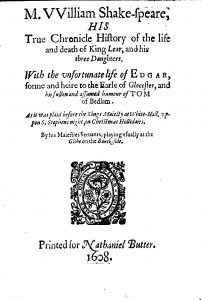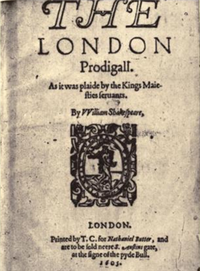In 1605 The London Prodigal was published with a similar, but this time, full authoritative gloss: ‘As it was played by the Kings Majesties Servants. Written by William Shakespeare’. Again, the author is unknown and disputed. The printer, Nathaniel Butter, published King Lear three years later with a similar title page attribution: ‘M. William Shake-speare: his true chronicle history of the life and death of King Lear… By his Majesties servants playing usually at the Globe on the Bank-side.’ There are marked differences between this King Lear and 1623 Folio version, but it is not among those books that scholars refer to as ‘bad quartos’; rather, there is evidence that the later version was revised from the earlier one, and aspects of both are used in most versions of Lear now published.
 Butter’s quarto of Lear was badly set by its compositors who, it has been shown, were inept and unused to printing plays;[1] Butter did not use the printer, Nicholas Okes, to print any further publications until 1614. But the compositors’ errors do not mean this first edition of King Lear was unauthorised. Shakespeare could not be expected to be involved in overseeing the printing process, beyond handing over the manuscript and trusting the publisher to do their job. Madeleine Doran states ‘there is nothing suspicious in the publication…the entry in the Stationers’ Register would seem to prove that it was printed from an authentic manuscript’.[2]
Butter’s quarto of Lear was badly set by its compositors who, it has been shown, were inept and unused to printing plays;[1] Butter did not use the printer, Nicholas Okes, to print any further publications until 1614. But the compositors’ errors do not mean this first edition of King Lear was unauthorised. Shakespeare could not be expected to be involved in overseeing the printing process, beyond handing over the manuscript and trusting the publisher to do their job. Madeleine Doran states ‘there is nothing suspicious in the publication…the entry in the Stationers’ Register would seem to prove that it was printed from an authentic manuscript’.[2]
This entry — in a register that rarely gave more than a book’s title — was unusually elaborate. Dated 26 November 1607, it reads:
Entered for their copy under the hands of Sir George Buck, knight, and the wardens, a book called Mr. William Shakespeare his history of King Lear, as it was played before the Kings majesty at Whitehall upon St. Stephens night at Christmas last by his majesties servants playing usually at the globe on the Bankside.
 King Lear was licensed for printing by the same man who had recorded a conversation with Shakespeare on his copy of George A Green. The entry in the Stationers’ Register does not say that it was written ‘by William Shakespeare’ rather, it records ownership: the book is called Mr William Shakespeare his history of King Lear’. How likely is it that Shakespeare was unaware of Butter’s printing of The London Prodigal, a property of his company, published openly as a King’s Men play and claiming to be ‘Written by William Shakespeare’? If the attribution of The London Prodigal had not been authorised, what would possess him to hand over King Lear to the same man? Does it not seem more reasonable that both The London Prodigal and King Lear were sold to their publisher by Shakespeare? If King Lear can be accepted as ‘a play printed with the King’s Men’s blessing’, surely The London Prodigal could be regarded in the same light?
King Lear was licensed for printing by the same man who had recorded a conversation with Shakespeare on his copy of George A Green. The entry in the Stationers’ Register does not say that it was written ‘by William Shakespeare’ rather, it records ownership: the book is called Mr William Shakespeare his history of King Lear’. How likely is it that Shakespeare was unaware of Butter’s printing of The London Prodigal, a property of his company, published openly as a King’s Men play and claiming to be ‘Written by William Shakespeare’? If the attribution of The London Prodigal had not been authorised, what would possess him to hand over King Lear to the same man? Does it not seem more reasonable that both The London Prodigal and King Lear were sold to their publisher by Shakespeare? If King Lear can be accepted as ‘a play printed with the King’s Men’s blessing’, surely The London Prodigal could be regarded in the same light?
[1] Much of the information about the first quarto of King Lear, and the quote about the King’s Men’s blessing regarding its publication, were gleaned from King Lear: New Critical Essays, ed. Jeffrey Cahan (Routledge, 2008), p.176-7.
[2] The Text of King Lear by Madeleine Doran, p.123.
Click Here to Subscribe and we’ll notify you about new content.